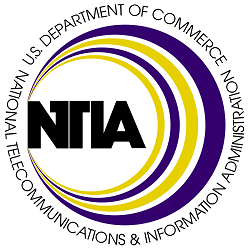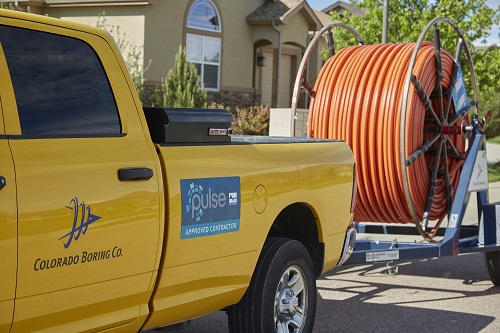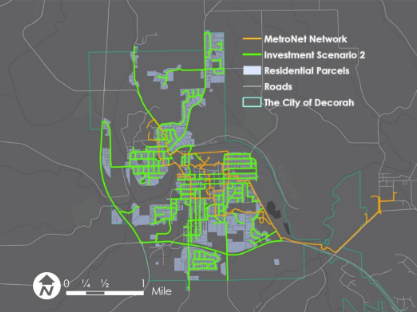
Fast, affordable Internet access for all.


This week on the podcast we bring back a fan favorite from a year ago that feels particularly relevant, especially as the FTC prepares itself to undertake landmark antitrust cases against Google and Amazon.
Christopher is joined by Harold Feld, Senior Vice President at Public Knowledge. Feld is a staple of the field, and has been a consistent voice not only for consumers but broadband advocates of all types for more than two decades.
The show takes on a reflective nature, as they talk about theories of change in the context of doing broadband policy today. Harold shares how he thinks of the progress that gets made in the long term by aligning the corporate incentive with the public interest. He shares coming to terms with having lots of hard days, the power of fighting battles you expect to lose, and learning, getting better, and building powerful coalitions along the way. Harold and Christopher end the show by talking about some examples of the latter, including important wins like the Rural Tribal Priority Window and the expansion of community networks of all shapes and sizes.
This show is 48 minutes long and can be played on this page or via iTunes or the tool of your choice using this feed. You can listen to the interview on this page or visit the Community Broadband Bits page.
Transcript below.
We want your feedback and suggestions for the show-please e-mail us or leave a comment below.
Listen to other episodes here or view all episodes in our index.
Subscribe to the Building Local Power podcast, also from the Institute for Local Self-Reliance, on iTunes or Stitcher to catch more great conversations about local communities, the concentration of corporate power, and how everyday people are taking control.
Thanks to Arne Huseby for the music. The song is Warm Duck Shuffle and is licensed under a Creative Commons Attribution (3.0) license.

Join us Thursday, September 28th at 3pm ET for the latest episode of the Connect This! Show. Co-hosts Christopher Mitchell (ILSR) and Travis Carter (USI Fiber) will be joined by regular guest Doug Dawson (CCG Consulting) and Kim McKinley (UTOPIA Fiber), with special guest Sean Gonsalves (ILSR) to tackle the promised return of net neutrality rules by the FCC, Google Fiber's recently announced ACP plans, why the word "monopoly" seems in such short supply in the BEAD plans states have begun to file, and the future of spectrum sharing in the United States.
Email us at broadband@communitynets.org with feedback and ideas for the show.
Subscribe to the show using this feed or find it on the Connect This! page, and watch on LinkedIn, on YouTube Live, on Facebook live, or below.
As the National Telecommunications and Information Administration (NTIA) continues to move forward in administering the single biggest federal investment to expand high-speed Internet access in U.S. history, each state and U.S. territory is wrestling with how to best spend the windfall as they lay out their Five Year Action Plans and Initial Proposals necessary to claim their portion of the $42.5 billion BEAD program.
One major barrier to providing universal access to fast, reliable and affordable Internet service–long recognized by ILSR, telecom experts, and a growing number of ordinary citizens–are the monopoly-friendly preemption laws that either outright ban or erect insurmountable barriers to building publicly-owned, locally-controlled broadband networks, aka municipal broadband.
Preemption in the BEAD Era
Currently, 17 states have such preemption laws, most of which have filed their Five Year Action Plans and/or their Initial Proposals. In each of those states, at the behest of Big Cable and Telecom incumbents, state lawmakers have erected legislative barriers to municipal broadband to protect the monopoly players from competition, which is at the very heart of why the digital divide exists in the first place and why tens of millions of Americans suffer from the slower speeds and higher costs that go hand in hand with monopoly service.

This week on the show, Christopher is joined once again by Sean Gonsalves, Associate Director for Communications for the Community Broadband Networks initiative at the Institute for Local Self-Reliance. After a short stop to talk about the establishment of a new municipal network in Timnath, Colorado, Christopher and Sean get down to talking about the BEAD 5-Year Plans that states are filing with NTIA to get their hands on the first tranche of what will be an historic pot of federal funds for new broadband investment.
Some states, like Maine and Vermont, Sean shares, are doing lots right: setting high bars for new infrastructure, listening to communities about their needs, folding in digital equity initiatives, and thinking about how to reach the last households that BEAD will fall short of. Others, like Pennsylvania, seem written with the intent to waste public money and leaves tens of thousands of households stranded with poor or no service - in other words, exactly what the monopoly cable and telephone companies want.
This show is 37 minutes long and can be played on this page or via Apple Podcasts or the tool of your choice using this feed.
Transcript below.
We want your feedback and suggestions for the show-please e-mail us or leave a comment below.
Listen to other episodes here or view all episodes in our index. See other podcasts from the Institute for Local Self-Reliance here.
Thanks to Arne Huseby for the music. The song is Warm Duck Shuffle and is licensed under a Creative Commons Attribution (3.0) license.
A massive coalition of more than 300 broadband policy experts and organizations have written a letter to the U.S. government, warning that smaller broadband providers, nonprofits, and municipalities will be elbowed out of an historic $42.45 billion broadband grant program without some notable changes to program rules.
At the heart of their concerns sits the Broadband Equity Access and Deployment (BEAD) program, made possible by the recently passed infrastructure bill, and administered by the National Telecommunications and Information Administration (NTIA). The grant program is a once-in-a-lifetime opportunity to put a significant dent in America’s longstanding digital divide.
But BEAD program rules currently require grant recipients to obtain a letter of credit (LOC) from a bank, collateralized by cash or cash-equivalent. They also require grant winners to provide "matching funds of not less than 25 percent of project costs," though the latter restriction can be waived in some high deployment cost areas.
While the restrictions were intended to reduce the risk of project failure (a touchy subject for the government in the wake of problems with the FCC’s RDOF program), they require grant recipients to lock away vast and untouchable sums of capital for the duration of any broadband build, most of which last several years.
Berthoud, Colorado, population 11,717, is the latest Colorado community to explore community broadband alternatives to expand public access to affordable fiber. Currently in the process of crafting a request for quote (RFQ), the city tells ILSR it hopes to make its final determination by November and have a preliminary plan in place by the end of the year.
Originally, Berthoud had planned on forming a coalition with three neighboring Colorado towns (Johnstown, Mead and Milliken) in a bid to expand access. That plan involved striking a memorandum of understanding (MOU) with Lincoln, Nebraska based Allo Communications, to deliver fiber to every address within three years.
But city leaders say the original plan wasn’t meant to be.
“The four communities did not strike a deal with Allo,” Berthoud Business Development Manager Walt Elish told ILSR. “We could not come to terms. Since then, we have looked at other options, including a town-owned network.”

As with many towns and counties, the high cost of a municipally owned broadband network has the city examining different options, including a potential public private partnership (PPP) with existing providers. PPPs are increasingly common but can have their downsides, including less municipal control over pricing or the potential trajectory of the finished network.
The key for states to unlock their portion of the $42.5 billion in federal BEAD funds is the submission and approval of their Five Year Action Plans and Final Proposal. The infrastructure law requires states to first file an action plan, and then prepare more detailed Initial Proposals, allowing residents and stakeholders to submit public comments.
So far, 14 states have filed their Five Year Action Plans with the National Telecommunications and Information Administration (NTIA), the Treasury Department agency in charge of allocating the funds to each state and U.S. territory. According to the NTIA’s website, Maine, Louisiana, Delaware, Georgia, Hawaii, Idaho, Kansas, Montana, North Carolina, Ohio, Oregon, Pennsylvania, Utah, and Vermont have all filed their draft Five Year Action Plans.

The states that are now in the process of completing their Initial Proposals include: Delaware, Kansas, Louisiana, Montana, Ohio, Tennessee, Vermont, Virginia and Wyoming.
Today, we will look at two states (Maine and Louisiana) and follow up with the others as we are getting a clearer picture of how each state intends to put this historic infusion of federal funds to use.
Maine
Loveland’s municipal broadband utility Pulse is a heartbeat away from expanding into a small neighboring Colorado town eager to offer its residents the same attractive, high-quality Internet access that can be found in Larimer County’s biggest cities.
Officials in Loveland and Timnath, Colorado (pop. 7,800) recently announced the ratification of an Inter-Governmental Agreement (IGA) that greenlight’s a plan to bring ubiquitous, affordable high-speed Internet access to yet another community in the Centennial State, as an increasing number of Colorado cities and towns embrace municipal broadband after years of frustration with the inadequate, high-priced service from the region’s monopoly incumbents.
"The selection of Pulse as our broadband service provider reflects a thorough process of assessment and consideration,” Timnath Town Planner Brian Williamson said in a press statement after the agreement was approved. “We are excited to work together, leveraging their expertise to ensure our residents have access to reliable, high-speed Internet that will contribute to the growth and prosperity of Timnath."
Keeping Up With The Loveland’s
This week Williamson spoke to ILSR about the project and why a town-wide fiber network is such valuable and vital infrastructure.

“Timnath is an interesting place. We are predominantly a residential community and we are growing quickly,” he said, adding that in a post-pandemic world of distance learning, remote work, and telehealth, an important part of the mix when people decide where to live and work is whether that community has reliable and affordable high-speed Internet access.
Decorah, Iowa is moving forward on a long-percolating plan to expand the city’s core fiber ring to provide affordable broadband access to long-neglected residents and businesses.
While the project has been discussed for years, local officials tell ISLR the project gained renewed momentum during peak COVID, and is creeping closer to launch.
Contracts are still being finalized as the city hopes to spend somewhere around $12 to $15 million to deliver fiber to all 3,000 potential subscriber locations. The full project would take about three years to deliver fiber to all 7,740 city residents, with the first subscribers potentially coming online this fall.

“Decorah has been in pursuit of fiber to the premises for the last 8 to 9 plus years and we finally have broken through some of our challenges on how to get to the finish line,” Chopper Albert, Decorah IT Director told ISLR.
According to Albert, Decorah’s recent progress is thanks in part to new City Manager Travis Goedken, who has long advocated for expanding the city’s existing fiber network to drive affordable fiber access citywide.
New City Management Team Pushes Forward
Since 2013 the city has owned an 11-mile core fiber network, dubbed the Decorah MetroNet. MetroNet was born out of frustration after a major flood in 2008 across much of Iowa resulted in prolonged communications network outages.
MetroNet (not to be confused with the Indiana-based ISP that goes by the same name) currently provides access to Luther College and 18 additional government buildings and anchor institutions.
For over 20 years, the city of Palo Alto, the "Birthplace of Silicon Valley,” has flirted with the idea of building a city-owned municipal fiber network. Now after years of debate, numerous studies, several false starts, and many unfulfilled RFPs, city officials say they’re finally moving forward with a city-owned fiber network they hope will transform affordable broadband connectivity citywide.
Palo Alto officials tell ILSR that the project will be spearheaded by the city-utility, and deployed in coordination with a major upgrade of the city’s electrical systems. Phase One of the city’s planned fiber deployment should begin later this year, delivering fiber access to around 20 percent of the city–or 6,500 homes and businesses.
Phase One will be funded entirely from the utility’s existing cash reserves. Profits from that deployment will then be used to expand affordable, multi-gigabit fiber access to all of the city’s 63,210 residents. Though no shortage of challenges remain.
A Long Time Coming
That Palo Alto residents have been clamoring for better, more affordable alternatives to regional telecom monopolies for 25 straight years speaks for itself. The high costs, slow speeds, and abysmal customer service of regional telecom giants AT&T and Comcast have long driven the public’s unflagging interest in better, cheaper connectivity options.